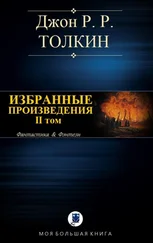“Thorin! Balin! Oin! Gloin! Fili! Kili!” he cried as loudly as he could. “The light’s gone out! Someone come and find and help me!”
The dwarves waited a moment or two, and then Thorin said, “We have to go and help our burglar.”
“It is our turn to help,” said Balin, “and I am ready to go.”
Gloin lit several more torches, and then they all crept out, one by one, and went along the wall. Soon they met Bilbo.
“It was only a bat and a dropped torch, nothing worse!” he said in answer to their questions. Now the dwarves wanted to explore the hall, and they were sure that Smaug was away from home. They forgot fear and gathered gems and stuffed their pockets. Thorin searched from side to side for something which he could not find. It was the Arkenstone; but he spoke of it yet to no one.
The dwarves took down weapons from the walls, and armed themselves.
Thorin put on Bilbo a small coat of mail, [93]made for some young elf-prince long ago. It was of silver-steel, and with it went a belt of pearls and crystals. A beautiful light helmet decorated with white gems was set upon the hobbit’s head.
“Thorin!” Bilbo cried aloud suddenly. “What next? We are armed but it won’t help us kill the dragon. We are not looking for gold yet, but for a way of escape!”
“You speak the truth!” answered Thorin. “Let us go! I will guide you. I still remember the ways of this palace.” Then they gathered together, and passed through the gaping doors.
They had covered their bright mail again with their old cloaks and their helmets with their hoods, and one by one they walked behind Thorin. Up, up, the dwarves went, and they met no sign of life. Suddenly they saw an opening far above, and the air smelt sweeter.
“This is the great chamber of Thror,” said Thorin; “the hall of feasting and of council. Not far off now is the Front Gate.”
They passed through the ruined chamber. Tables, chairs and benches were overturned. Skulls and bones were on the floor among bowls and broken drinking-horns and dust. Soon they heard a sound of water. “There is the birth of the Running River,” said Thorin. “From here it runs to the Gate. Let us follow it!”
Beside the stream there was a stone-paved road. The friends ran along the road, and soon they saw the broad light of day coming through the huge arch. They were dazzled. They came to the Front Gate, and were looking out upon Dale.
Suddenly Bilbo realized that he was not only tired but also very hungry indeed.
“I suppose it is breakfast-time,” he said. “But I don’t think this is the safest place for a meal. Let’s go somewhere where we can sit quietly!”
“Quite right!” said Balin. “And I think we should go to the old look-out post [94]at the Southwest corner of the Mountain.”
“How far is that?” asked the hobbit.
“Five hours march,” I think.
“Oh!” grumbled the hobbit. “Again we have to walk and climb somewhere without breakfast!”
“We must move away from here,” said Don. “I feel as if Smaug’s eyes were on the back of my head.”
“Come on! Come on!” cried the others. “Let us go!”
Soon they came to a deep valley among the rocks; there they rested for a while and had some biscuits and water.
After that they went on again. At last they reached the hill path. Finally in the late afternoon they came to the top of the ridge and saw the sun going downwards to the West.
Here on the rock they found a flat place open to East and South and West. “Here,” said Balin, “in the old days we always kept watchmen and that door in the rock behind leads into a guardroom. There we can stay until tomorrow.”
So they went inside. Some of them fell asleep at once, while others discussed their plans. Still they didn’t know where Smaug was.
Chapter 14
Fire and Water
Now if you wish, like the dwarves, to hear news of Smaug, you must go back again to the evening when he smashed the door and flew off in rage, two days before.
The men of the lake-town Esgaroth were mostly at home, because the wind was cold, but a few were walking and watching the stars.
Then suddenly a great light appeared in the hills and the northern end of the lake became golden.
“The King beneath the Mountain!” they shouted. “His wealth is like the Sun, his silver like a fountain, his rivers golden run! The river is running gold from the Mountain!” they cried, and everywhere windows were opening and feet were hurrying.
There was once more a great excitement. But one man cried: “The dragon is coming or I am a fool! Cut the bridges! To arms! [95]To arms!”
Then the joy was turned to fear. Soon they could see the dragon rushing towards them. Still they had a little time. Every vessel in the town was filled with water, every warrior was armed, and the bridge to the land was destroyed.
Amid shrieks and wailing and the shouts of men he came over them, swept towards the bridges and stopped! The bridge was gone, and his enemies were on an island in deep water.
Roaring the dragon swept back over the town. Men shot arrows. No one had dared to give battle to him for many years, so he was furious now.
Fire leaped from the dragon’s jaws. Then down he swooped straight through the arrow-storm; he wanted to set their town on fire.
Flames sprang high into the night. Already men were jumping into the water on every side. Women and children ran to the boats in the market-pool. Now men dropped their weapons. But there was still a company of archers among the burning houses. Their captain was Bard. He was a descendant in long line [96]of Girion, Lord of Dale, whose wife and child had escaped down the Running River from the ruin long ago. Now he shot with a great bow, till he spent all his arrows but one. [97]The flames were near him. His companions were leaving him. He bent his bow for the last time. Suddenly a bird sat down on his shoulder. It was an old thrush. It brought him news. Bard understood its language, because he was of the race of Dale.
“Wait! Wait!” the bird said to him. “The moon is rising. Look for the hollow of the left breast as he flies above you!” And then it told him of all that it had heard. Bard drew his bow-string to his ear. The dragon was flying low, and as he came the moon rose and silvered his great wings.
“Arrow!” said the bowman. “Black arrow! I have saved you to the last. You have never failed me. I had you from my father and he – from of old. [98]So go now and speed well!”
The black arrow sped straight from the string, straight for the hollow by the left breast. With a shriek Smaug turned over and crashed down.
He fell on the town. The lake roared in. A vast steam leaped up, white in the sudden dark under the moon. There was a hiss, and then silence. And that was the end of Smaug and Esgaroth, but not of Bard. And three quarters of the people of the town had escaped alive; their woods and fields and pastures and cattle and most of their boats remained undamaged; and the dragon was dead. So they praised the courage of Bard and his last mighty shot.
Bard wanted to rebuild Dale. And he said: “This is no time for words. There is work to do.”
Then he went to help the sick and the wounded. Not all the people could get shelters and there was little food. Bard had a hard task to direct the preparations for people’s protection and housing. But help came quickly; Bard had sent speedy messengers up the river to the Forest to ask the aid of the King of the Elves of the Wood. The Elvenking had received news from his own messengers, and already knew of what had happened. Far over Mirkwood news spread: “Smaug is dead!” Beorn had heard it in his wooden house, and the goblins were at council [99]in their caves.
Читать дальше
Конец ознакомительного отрывка
Купить книгу
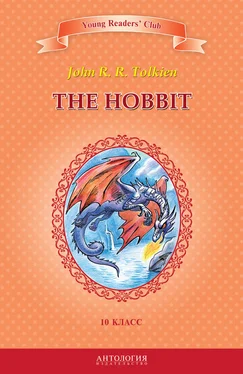
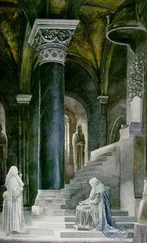

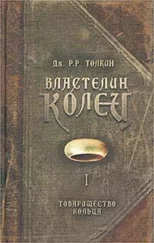

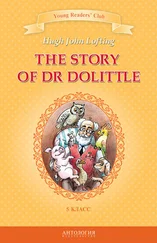

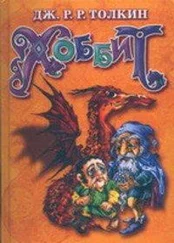
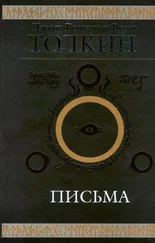
![Джон Толкин - Хоббит [litres]](/books/390419/dzhon-tolkin-hobbit-litres-thumb.webp)
![Джон Толкин - Путешествие хоббита [сценарий спектакля]](/books/395951/dzhon-tolkin-puteshestvie-hobbita-scenarij-spektakl-thumb.webp)
